Every Sunday after church, my father would disappear into the kitchen and start browning beef in his favorite cast iron pan. The smell of onions and garlic would fill our small house, and we knew we were in for something special. His carne guisada was our family's weekend tradition: tender chunks of beef swimming in a rich, spicy tomato sauce with perfectly cooked potatoes.
I watched him make this dish countless times, learning that the secret wasn't just in the ingredients, but in the patience to let everything simmer low and slow. Now I make this same recipe for my own family.
Every time I smell those familiar aromas, I'm instantly transported back to those Sunday afternoons when food was more than just a meal, it was love on a plate.
Jump to:
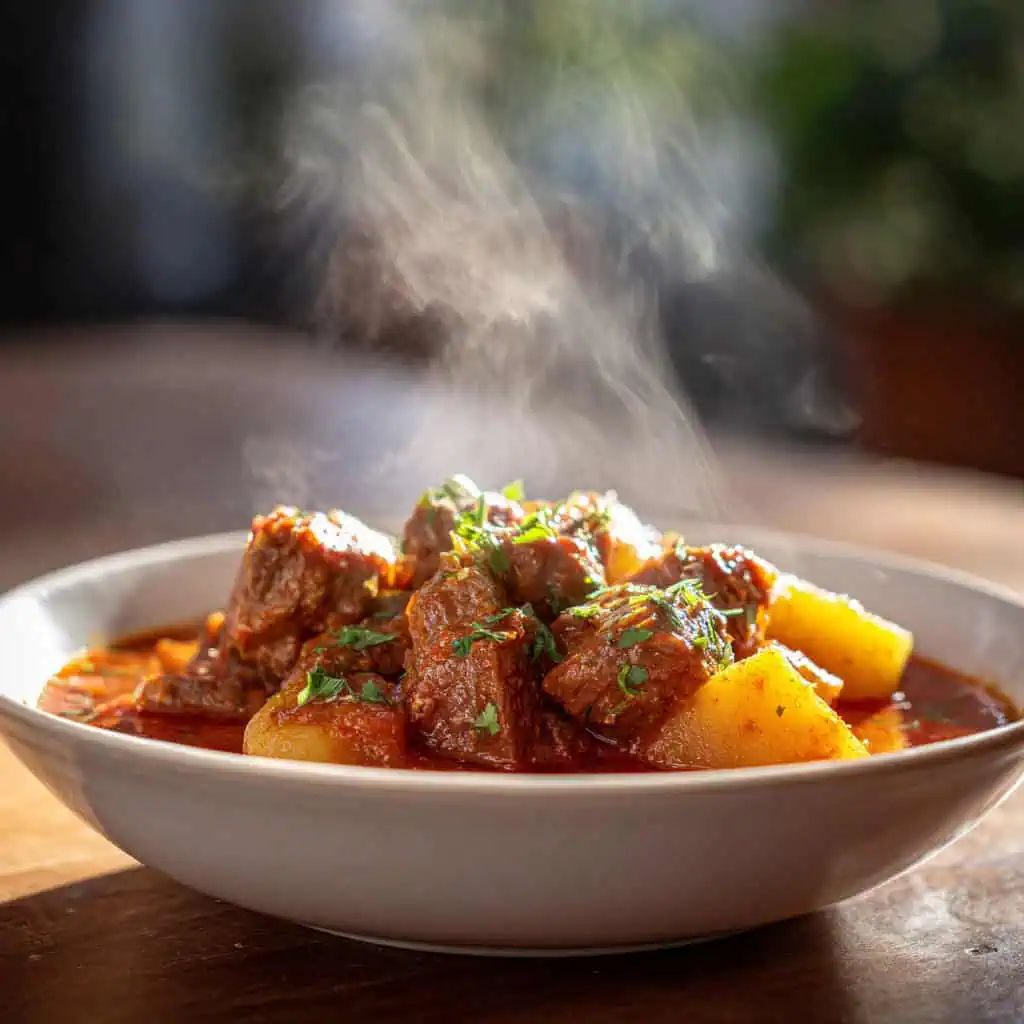
Why You'll Love This Recipe
This carne guisada brings together the best of Filipino and Mexican flavors in one comforting bowl. The tender beef practically melts in your mouth after slow braising, while the potatoes soak up all those rich, spicy tomato flavors. It's the kind of recipe that fills your kitchen with amazing aromas and feeds your family without breaking the bank.
Plus, it's made with simple ingredients you probably already have in your pantry, making it perfect for those busy weeknight dinners when you want something special but don't have hours to spend in the kitchen.
Ingredients
- 1 tablespoon canola oil
- 1 large onion, peeled and chopped
- 2 cloves garlic, peeled and minced
- 2 pounds chuck steak, sliced thinly
- 4 large Roma tomatoes, chopped
- 1 jalapeño pepper, seeded and minced
- 1½ cups water or beef broth
- 2 medium potatoes, peeled and cubed
- Salt and pepper to taste
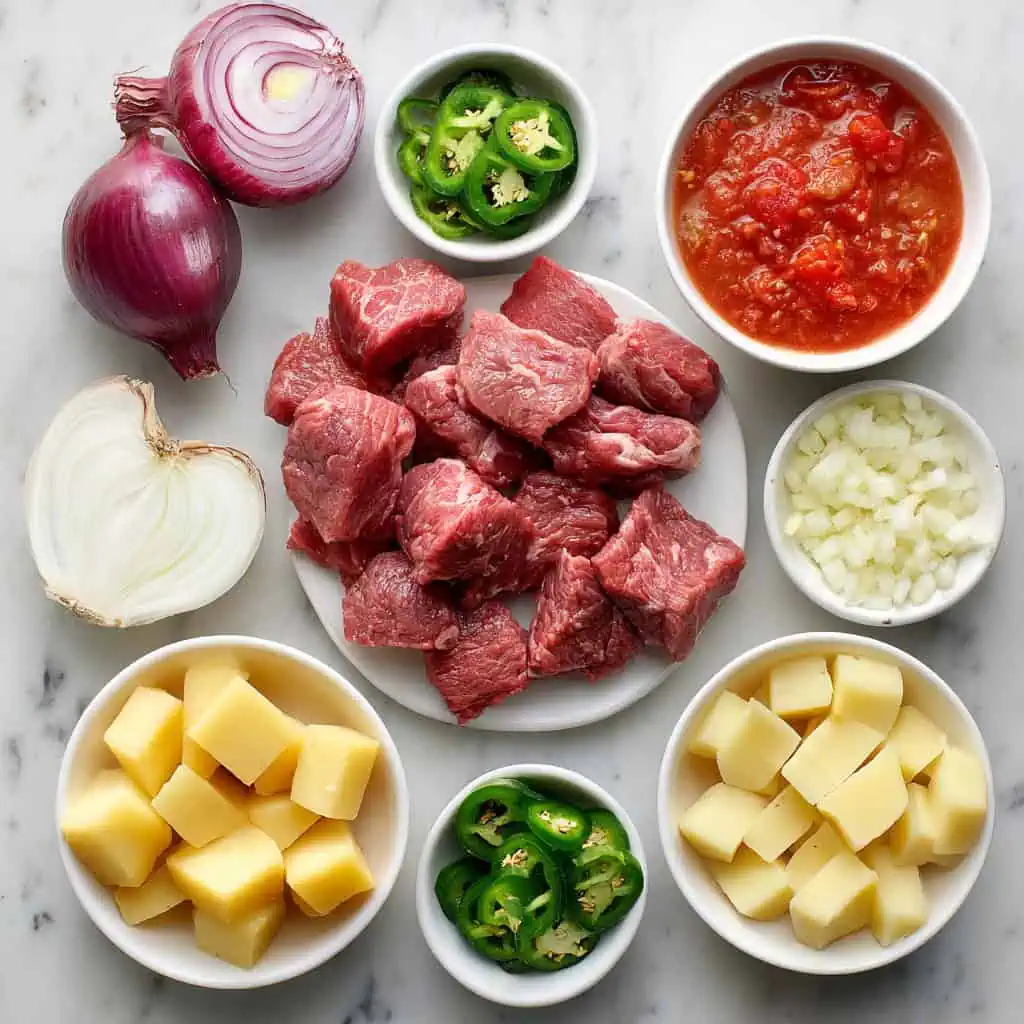
This recipe builds on the Filipino holy trinity of onions, garlic, and tomatoes that creates a rich, savory base. Chuck steak becomes incredibly tender when braised slowly, while Roma tomatoes provide the perfect balance of sweetness and acidity.
The jalapeño adds just enough heat without overwhelming the dish, and potatoes make this a complete, hearty meal that stretches the servings beautifully.
Equipment
- Dutch Oven or Wide Skillet - Essential for even heat distribution and enough space to brown the beef properly without overcrowding
- Sharp Knife - For slicing beef thinly across the grain and chopping vegetables uniformly
- Cutting Board - Large enough to handle all your prep work safely
- Wooden Spoon - Perfect for mashing tomatoes and stirring without scratching your cookware
- Measuring Cups and Spoons - For accurate liquid and seasoning measurements
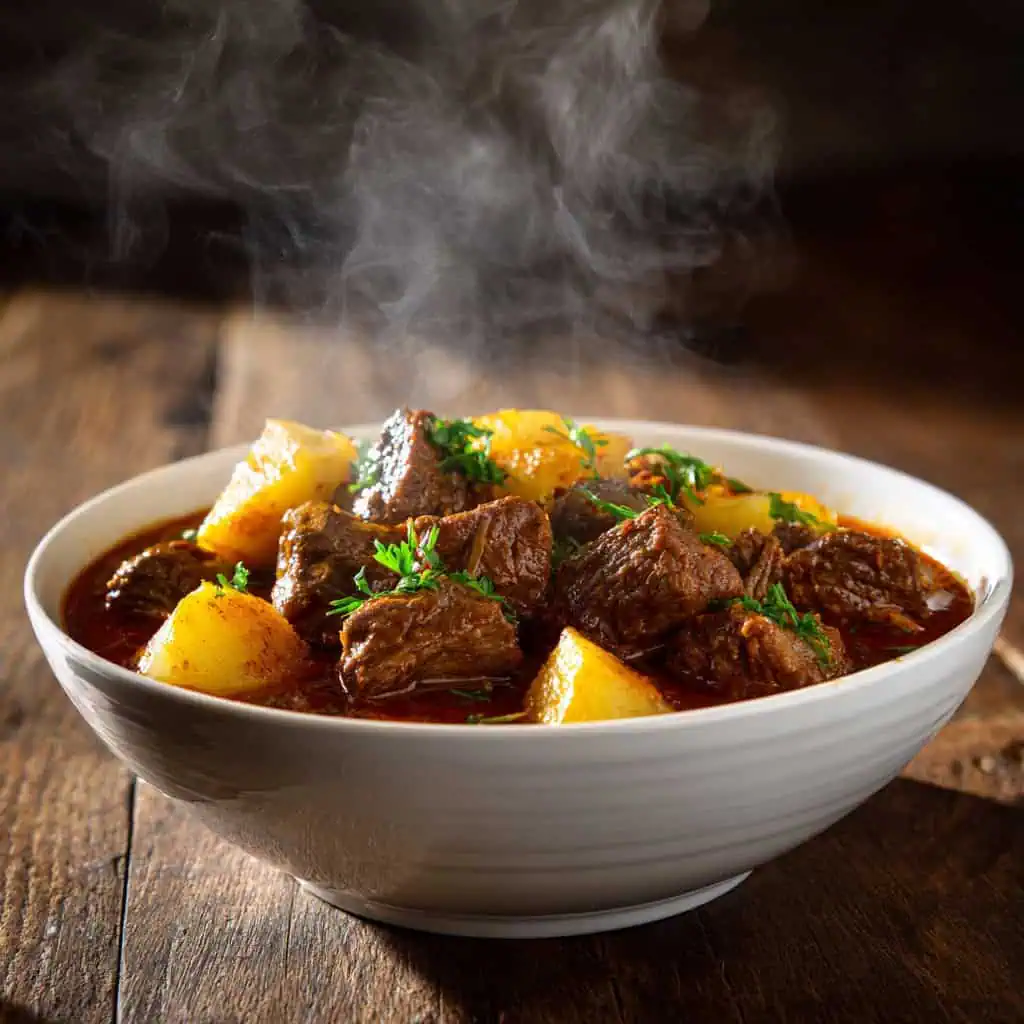
How To Make
- Heat the canola oil in your dutch oven or wide skillet over medium heat. The oil should shimmer slightly when it's ready, which ensures your aromatics won't stick.
- Add the chopped onions and minced garlic to the hot oil. Cook them for about 2-3 minutes, stirring occasionally, until they become fragrant and the onions turn translucent. This creates the flavor foundation for your entire dish.
- Add the thinly sliced chuck steak to the pan. Cook for 5-7 minutes, stirring occasionally, until the beef is lightly browned on most surfaces. Don't worry about cooking it completely through at this stage.
- Add the chopped Roma tomatoes to the pan. Using the back of your wooden spoon, gently mash the tomatoes as they cook. Continue cooking for 4-5 minutes until the tomatoes have softened and released their juices, creating a rich sauce base.
- Pour in the water or beef broth and bring the mixture to a boil. As it heats up, you'll notice some foam or scum rising to the surface. Skim this off with a spoon for a clearer, cleaner-tasting broth.
- Add the minced jalapeño pepper to the pot. The seeds have been removed to control the heat level, but you can add them back if you prefer more spice.
- Reduce the heat to low, cover the pot, and let it simmer gently for 40-50 minutes. Stir occasionally and add water in ½ cup increments if the liquid level gets too low. The beef should become fork-tender during this time.
- Add the cubed potatoes to the pot and continue cooking for 8-10 minutes. The potatoes should be tender when pierced with a fork, and the sauce should have thickened nicely by this point.
- Taste and season with salt and pepper as needed. Remember to start with less salt since the flavors will have concentrated during cooking. Serve immediately while hot.

Tips from Lola's Kitchen
- Always slice your beef against the grain - this breaks down the muscle fibers and makes every bite tender
- Let your tomatoes cook down properly before adding liquid - this concentrates their flavor and prevents a watery sauce
- Don't rush the braising process - low and slow cooking is what makes the beef melt-in-your-mouth tender
- Taste and adjust seasoning at the end - the flavors develop throughout cooking and may need a final boost
- If your sauce seems too thin, remove the lid and let it simmer uncovered for the last few minutes
Substitutions
- Chuck steak → Beef short ribs, brisket, or stew meat (adjust cooking time as needed)
- Roma tomatoes → 1 can (14 oz) crushed tomatoes or tomato sauce
- Jalapeño → Serrano peppers for more heat, or bell peppers for mild flavor
- Potatoes → Sweet potatoes, carrots, or turnips for different flavors
- Canola oil → Vegetable oil, olive oil, or even bacon fat for extra richness
Troubleshooting
- Beef is tough → Continue cooking longer on low heat - tough cuts need time to break down
- Sauce is too thin → Remove lid and simmer uncovered, or mix 1 tablespoon cornstarch with cold water and stir in
- Too spicy → Add a splash of coconut milk or a pinch of sugar to balance the heat
- Not enough flavor → Add a beef bouillon cube or more salt and pepper to taste
- Vegetables are mushy → Add potatoes later in cooking, and cut them larger next time
Storage & Reheating
- Refrigerator: Store in airtight containers for up to 3 days
- Freezer: Freeze in freezer-safe containers for up to 2 months (note: potatoes may change texture slightly)
- Reheating: Warm gently in a saucepan over medium-low heat, stirring occasionally, until heated through to 165°F
- Microwave: Heat in 2-3 minute intervals, stirring between each interval to ensure even heating
- Pro tip: Add a splash of water or broth when reheating if the sauce has thickened too much
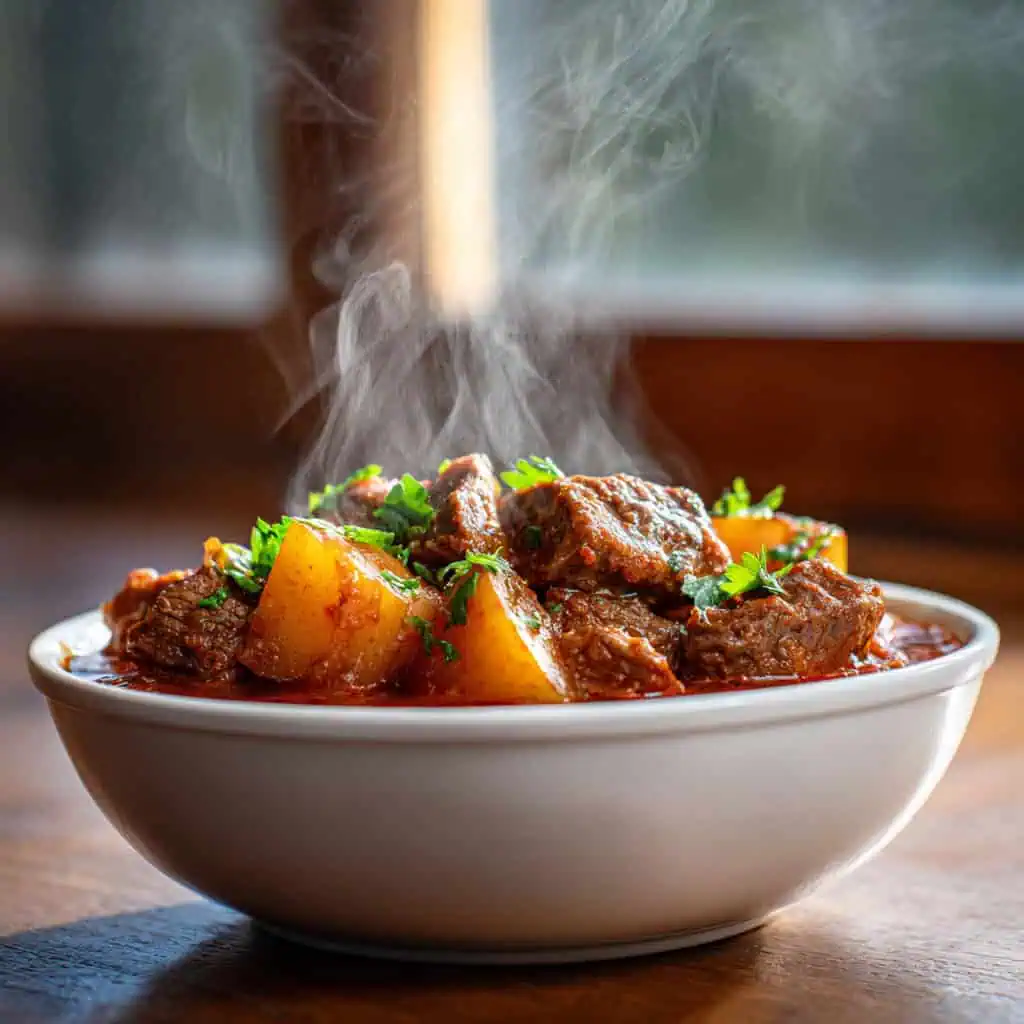
FAQ
Can I make this in a slow cooker?
Yes! Brown the beef and aromatics first, then transfer to slow cooker with remaining ingredients. Cook on low 6-8 hours.
What cut of beef works best?
Chuck steak is ideal because it becomes tender when braised, but you can also use chuck roast cut into strips.
How spicy is this dish?
With one seeded jalapeño, it has mild to medium heat. Adjust peppers to your preference.
Can I make this ahead?
Absolutely! This dish actually tastes better the next day as flavors meld together.
What should I serve with carne guisada?
Steamed rice is traditional, but it's also great with warm tortillas, crusty bread, or over mashed potatoes.
Can I double the recipe?
Yes, just use a larger pot and you may need to extend the cooking time slightly for the beef to become tender.
Related
Looking for other recipes like this? Try these:
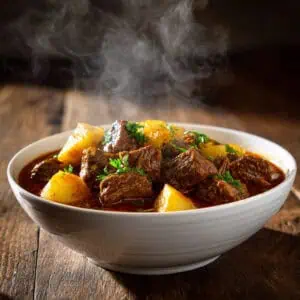
Carne Guisada Recipe (Filipino-Mexican Braised Beef Stew)
Ingredients
- 1 tablespoon canola oil
- 1 large onion peeled and chopped
- 2 cloves garlic peeled and minced
- 2 pounds chuck steak sliced thinly
- 4 large Roma tomatoes chopped
- 1 jalapeño pepper seeded and minced
- 1½ cups water or beef broth
- 2 medium potatoes peeled and cubed
- Salt and pepper to taste
Instructions
- Heat the canola oil in your dutch oven or wide skillet over medium heat. The oil should shimmer slightly when it's ready, which ensures your aromatics won't stick.
- Add the chopped onions and minced garlic to the hot oil. Cook them for about 2-3 minutes, stirring occasionally, until they become fragrant and the onions turn translucent. This creates the flavor foundation for your entire dish.
- Add the thinly sliced chuck steak to the pan. Cook for 5-7 minutes, stirring occasionally, until the beef is lightly browned on most surfaces. Don't worry about cooking it completely through at this stage.
- Add the chopped Roma tomatoes to the pan. Using the back of your wooden spoon, gently mash the tomatoes as they cook. Continue cooking for 4-5 minutes until the tomatoes have softened and released their juices, creating a rich sauce base.
- Pour in the water or beef broth and bring the mixture to a boil. As it heats up, you'll notice some foam or scum rising to the surface. Skim this off with a spoon for a clearer, cleaner-tasting broth.
- Add the minced jalapeño pepper to the pot. The seeds have been removed to control the heat level, but you can add them back if you prefer more spice.
- Reduce the heat to low, cover the pot, and let it simmer gently for 40-50 minutes. Stir occasionally and add water in ½ cup increments if the liquid level gets too low. The beef should become fork-tender during this time.
- Add the cubed potatoes to the pot and continue cooking for 8-10 minutes. The potatoes should be tender when pierced with a fork, and the sauce should have thickened nicely by this point.
- Taste and season with salt and pepper as needed. Remember to start with less salt since the flavors will have concentrated during cooking. Serve immediately while hot.
Tips from Lola's Kitchen
- Always slice your beef against the grain - this breaks down the muscle fibers and makes every bite tender
- Let your tomatoes cook down properly before adding liquid - this concentrates their flavor and prevents a watery sauce
- Don't rush the braising process - low and slow cooking is what makes the beef melt-in-your-mouth tender
- Taste and adjust seasoning at the end - the flavors develop throughout cooking and may need a final boost
- If your sauce seems too thin, remove the lid and let it simmer uncovered for the last few minutes
The Story Behind Carne Guisada
Carne guisada, which simply means "stewed meat" in Spanish, has traveled an incredible journey across cultures and continents to become the beloved comfort food we know today. This hearty dish originated in Spain centuries ago, where slow-cooking tough cuts of beef in wine and vegetables was a practical way to feed families on a budget. Spanish colonizers brought this cooking method to the Americas, where it evolved differently in each region it touched.
In Mexico, carne guisada became a staple of home cooking, with each family adding their own twist using local chiles, tomatoes, and spices. The dish spread northward into Texas, where it became so popular that many consider it a cornerstone of Tex-Mex cuisine. Meanwhile, Spanish influence in the Philippines created a similar love for braised meat dishes, with Filipino cooks mastering the art of slow-cooking beef until it falls apart with a fork.
What makes this particular recipe special is how it bridges these two culinary worlds. The Filipino technique of building flavor with the "holy trinity" of onions, garlic, and tomatoes meets the Mexican tradition of adding jalapeños for heat. This fusion creates a dish that's both familiar and exciting, combining the best of both cultures into one satisfying meal.
The beauty of carne guisada lies in its simplicity and flexibility. Every family has their own version, passed down through generations and adapted to local tastes and available ingredients. Some add bell peppers, others include potatoes like this recipe does, and many experiment with different types of chiles. This adaptability is what has made carne guisada such an enduring favorite across so many different cultures and kitchens.
Today, carne guisada continues to be the ultimate comfort food, the kind of dish that brings families together around the dinner table and creates lasting memories. Whether you're making it for a busy weeknight dinner or a special Sunday meal, this recipe connects you to a rich culinary tradition that spans continents and generations.
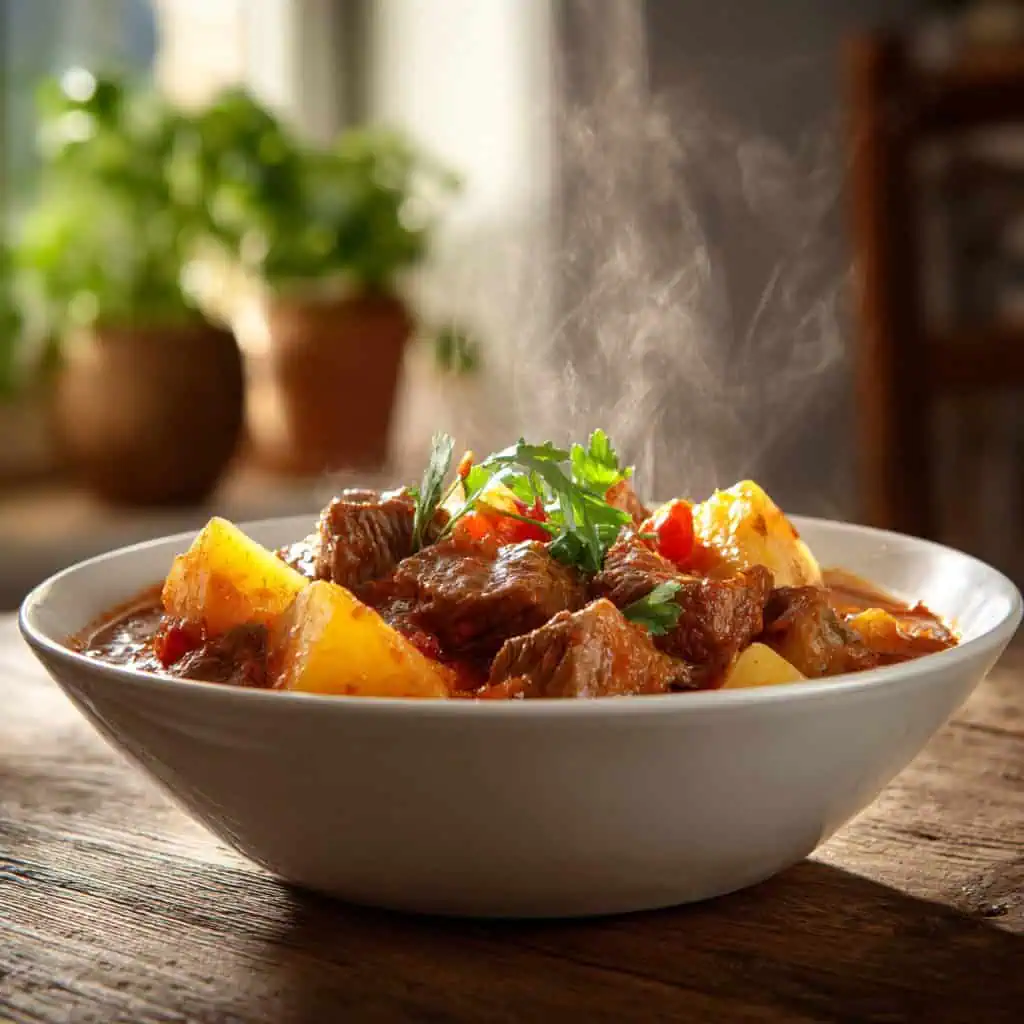






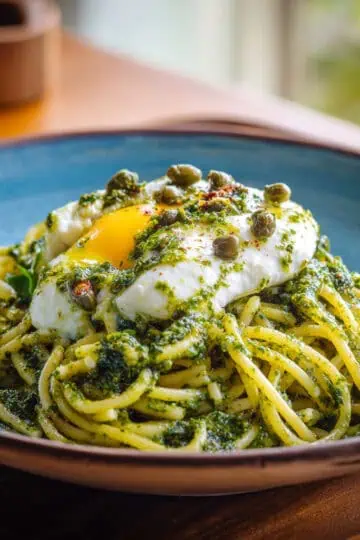
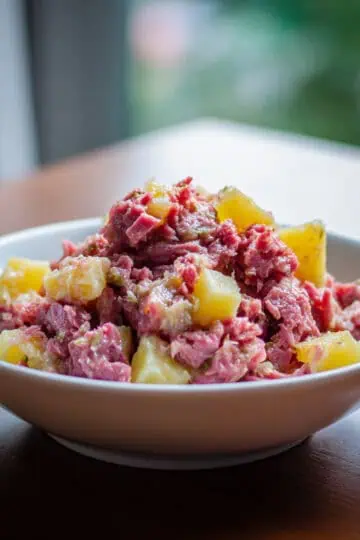

Comments
No Comments